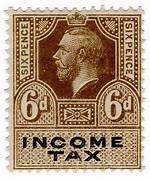On October 22, 1914, the United States implemented its first income tax, marking a significant shift in the country's tax policy and revenue generation. The introduction of the income tax represented a milestone in American history, as it established a more progressive system of taxation and helped fund government operations during a time of economic and social change.
The idea of an income tax had been debated for decades prior to its implementation in 1914. Prior to the income tax, the federal government primarily relied on tariffs and excise taxes to generate revenue. However, with the growing industrialization and increasing wealth disparity in the early 20th century, there was a growing sentiment that a more equitable and progressive tax system was needed.
The passage of the 16th Amendment to the United States Constitution in 1913 paved the way for the implementation of the income tax. This amendment granted Congress the power to levy taxes on income without apportionment among the states. It was a significant development, as it overruled a previous Supreme Court ruling that deemed income taxes unconstitutional.
The income tax was initially introduced with a relatively low rate and applied only to the wealthiest Americans. Individuals with an income above $3,000 (equivalent to around $80,000 today) were subject to a tax rate of 1%. The tax rate progressively increased for higher income brackets, with the top rate reaching 7% for individuals earning over $500,000 (equivalent to around $13 million today).
The income tax was seen as a means to address wealth inequality and provide a more stable and reliable source of revenue for the federal government. It allowed for a more progressive tax structure, where those with higher incomes paid a higher percentage of their earnings in taxes. This helped to redistribute wealth and fund government programs and initiatives.
The implementation of the income tax had a significant impact on American society and the economy. It allowed the government to fund various initiatives, including infrastructure development, social welfare programs, and defense spending. It also helped to offset the revenue lost from the reduction of tariffs and other indirect taxes.
Over the years, the income tax system has evolved and undergone numerous changes. The tax rates have fluctuated, and the tax code has become increasingly complex, with various deductions, exemptions, and credits. The income tax remains a crucial source of revenue for the federal government, funding essential services and programs.
The introduction of the income tax on October 22, 1914, marked a turning point in American taxation and fiscal policy. It represented a shift towards a more progressive system, where individuals with higher incomes paid a greater share of their earnings in taxes. The income tax has played a vital role in funding government operations, supporting economic growth, and addressing wealth disparities.
While the income tax has faced criticism and debate throughout its history, it continues to be a fundamental component of the American tax system. It serves as a means to generate revenue, ensure fairness in taxation, and provide for the needs of the nation. The income tax remains an integral part of American society and plays a crucial role in shaping the country's economic and social landscape.






